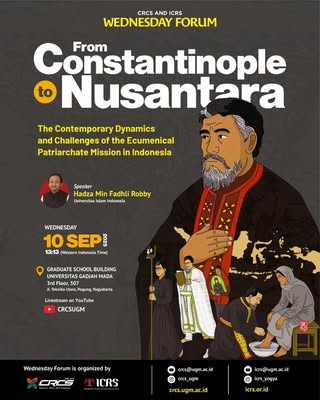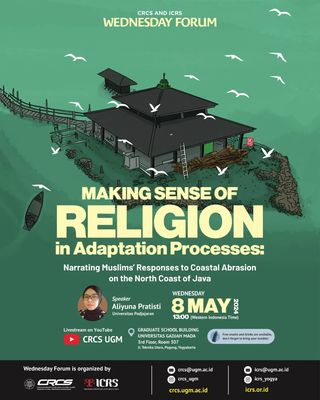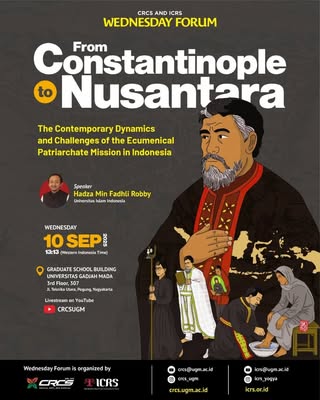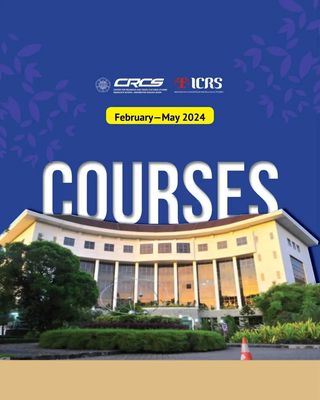
m rizal abdi
As the politics of identity and state favoritism toward certain religions intensified, the establishment of the Ministry of Hajj and Umrah has sparked concern. The creation of this new ministry is not solely an administrative issue, but a political action that could widen the disparities in service for religious communities in Indonesia. The question is whether the state is innovating its service or (unwittingly) adding fuel to the flame of polarization?
On the one hand, after last year’s disastrous hajj management, the urgency of establishing this ministry has become increasingly apparent. As the country with the largest muslim population in the world, hajj management in Indonesia frequently faces recurring problems: from very long queues, inefficient bureaucracy, to systemic corruption. The latter issue even led to the previous Minister of Religious Affairs being placed under a travel ban and investigated by the Corruption Eradication Commission (KPK). In this context, the existence of the Ministry of Hajj and Umrah can be understood as an institutional innovation designed to enhance the quality of state service to religious communities.
However, today's socio-political situation demands a more cautious reading. The state is not merely a provider of services, but also a representative of justice for all its citizens, regardless of their religion/beliefs. Indonesia is not a theocratic country or religious state; thus, the establishment of a special ministry for a particular religion raises a critical question: how do we address the needs of other religious groups equally? Moreover, does this preferential treatment narrow the space for equality within the framework of freedom of religion or beliefs (FoRB)?
The History of Hajj Management by the State in a Nutshell
The state’s special attention to hajj is not a new phenomenon in Indonesia. During the Dutch colonial period, the hajj was strictly monitored through successive Hajj Ordinances—issued in 1831, 1959, and renewed in 1913—for reasons of political security (Latif, 2012:118). The apparent involvement of hajj pilgrims in Java Wars and Padri Wars alarmed the Dutch for the potential of the Pan-Islamism movement brought by the pilgrims that could threaten colonial stability. On the other hand, the colonial government recognized the financial potential of the hajj pilgrim. Many European shipping companies profited significantly from the large flow of money from Indonesian hajj pilgrims. At the same time, there have been several reports of fraud and neglect of Indonesian hajj pilgrims by private companies (Guillot, 2013). Therefore, the colonial government saw these circumstances as a strategic reason to regulate and control the hajj pilgrimage in its colonies.
The existence of a special institution for managing the hajj continued into the independence era. Initially, hajj affairs were the responsibility of the Hajj Affair Division under the Ministry of Religious Affair (MoRA), and its management was carried out in collaboration with Yayasan Perjalanan Haji Indonesia (Umam, 1998:96). A significant institutional shift occurred during the Dwikora I Cabinet (1964—1966) when President Sukarno created a separate Ministry of Hajj, continuing until Dwikora III Cabinet. However, the ministry was dissolved during the Ampera Cabinet (1966—1967) on the grounds of efficiency. Though short-lived, the existence of the Ministry of Hajj during this era illustrates how the state felt the need to intervene in the hajj management, not only for administrative purposes but also as a symbolic political gesture.
During the New Order period, management of hajj affairs was once again placed under the Directorate General of Hajj Affairs within the MoRA. For decades, this position remained unchanged. However, partial reforms were introduced in 2014, one of which is the Hajj Financial Government. The enactment of UU no. 34/2014 on Hajj Financial Management marked a turning point. It leads to the establishment of Badan Pengelola Keuangan Haji, which was mandated to manage and develop hajj funds for the benefit of wider people. A further institutional development occurred in November 2024 when the government established Badan Penyelenggara Haji (BP Haji), a non-ministerial government agency tasked with overseeing the operational implementation of hajj pilgrimage. Acts as a transitional institution, BP Haji signaled the state’s intentions to consolidate hajj pilgrimage administration under a fully autonomous ministry.
Funded by All, Not Just Muslim
At first glance, the apparent bias of the MoRA toward Islam in Indonesia may seem justifiable, considering the proportion of Muslims in Indonesia, which reaches 87.8% (Dukcapil Kemendagri, 2024). In fact, this line of reasoning is not new. Minister of Religious Affairs Wahid Hasyim (in office 1949—1952) employed similar arguments when confronted by criticism that his ministry placed too much emphasis on the interest of Muslim (Noer, 1987: 340—341; Umam 1988:91). However, the so-called "majority" rationale becomes problematic, even ignorant, when situated against the ongoing discrimination and policy inequalities (Menchik, 2014).
In terms of budget allocation, this disparity is increasingly apparent. Let's look at the distribution and structure of the budget among the directorates general of the Ministry of Religious Affairs. In 2025 alone, the Budget Implementation List (DIPA) specifically for Muslims reached IDR 39.6 trillion, divided into the Directorate General of Islamic Community Guidance at IDR 2.3 trillion; the Directorate General of Hajj and Umrah Organization at IDR 1.4 trillion; and, most substantially, the Directorate General of Islamic Education at IDR 35.8 trillion. In contrast, the Directorate General of Christian Community Guidance, which has the highest budget after Islam, was allocated at around IDR 1 trillion, while the Directorate General of Buddhist Community Guidance was allotted just IDR 326 billion. It is important to note that the budget allocation for these non-Muslim directorates general is for all religious affairs, including religious education. These figures underscore a tremendous disparity in the scale of the budgetary resources as well as the scope of institutional responsibilities across religious communities.
It is important to note that all ministries in Indonesia are funded by the state budget, primarily sourced from taxes paid by all citizens, not just Muslims. As such, financing a ministry dedicated to managing religious rituals for one group raises a fundamental question of fairness for citizens of other faiths. This intensifies the challenge of fiscal justice in Indonesia’s religious sphere and underscores the argument that state favoritism here is both symbolic and material.
Seizing the FoRB Opportunities
Since it is financed by taxes from all Indonesian citizens, the Ministry of Hajj and Umrah should provide equitable benefits to the entire population, without exception. Furthermore, though its mandates are limited to the administration of specific rituals within a particular religion, the Ministry is nevertheless expected to adopt a more inclusive orientation toward diverse religious communities. Moreover, given the current political and religious climate, it is difficult to imagine this ministry being led by a non-Muslim Indonesian citizen. In other words, access to this ministry is unequal for all citizens. The involvement of non-Muslim personnel in the ministry's work, as revealed by the vice minister, does not necessarily eliminate the structural exclusivity of this institution. Ensuring greater inclusivity within this ministry is indeed a significant challenge for President Prabowo and his ministers.
The establishment of the Ministry of Hajj and Umrah certainly cannot be equated to other government policies, which often employ a testing-the-water approach: announce first, then cancel. Furthermore, President Prabowo has articulated the establishment of a dedicated hajj ministry for a long time, even since his presidential run in 2014. Therefore, despite all the criticism surrounding its creation, the idea of abolishing this new ministry is out of option right now. Thus, it is necessary to assess the potential opportunities offered by the establishment of the Ministry of Hajj and Umrah within the broader evaluative framework—for example, the advancement of FoRB in Indonesia.
With the burden of administering the Hajj and Umrah pilgrimages lifted, the MoRA can reform its institution and focus on addressing urgent religious matters, such as FoRB as mandated by the 1945 Constitution. The existing structure frequently leads the Ministry to play a reactive role, particulary responding to technical issues surrounding the hajj or religious conflit, rather than adopting a proactive policy that ensure equal recognition and protection for all religious communities.
In fact, the annual visibility of the Minister of Religious Affairs in public discourse has been dominated by three recurring issues: the isbat meeting to decide the start and the end of islamic calendar (especially the fasting month), the organization of Hajj affairs, and the management of religious conflict. These issues perpetuate a perception that the Ministry is disproportionately oriented toward the needs of the Muslim majority. The public distrust of this ministry toward a particular religion has not fully recovered after the previous Minister of Religion's "offside and misleading" claim that the MoRA was historically a state gift to Nahdlatul Ulama. Though the Muslims are numerically significant, this “favoritism” action risks sidelining the rights of marginalized religious communities.
Throughout the year, the Ministry has been criticized for acting more as a tool to uphold “religious hierarchy” than as a protector of religious diversity. Reports from civil society organizations, including annual monitoring by the Wahid Foundation, Setara Institute, and Human Rights Watch, consistently highlight unequal treatment among religious communities, ranging from discriminatory policies on house-of-worship permits to the Ministry’s reluctance to firmly address intolerance and violence toward marginalized groups. In fact, as shown by those reports, the Ministry often acts as perpetrator of violations of FoRB, especially at the local government level.
Furthermore, to this day, there is no official definition of religion in any legislation in Indonesia. In fact, international legal instruments do not provide an official definition of religion as well. Yet, the Ministry persistently administers a “recognized religions” framework and reproduces a narrow definition of religiousity. As a result, it marginalizes indigenous religious and religious groups outside “the six”, creating second-class categories of citizenship.
For the Ministry to stay meaningful in a a democratic and plural society, its role needs a reset. As the 1945 Constitution envisions, MoRA need to get back to its core duty: as a facilitator and guarantor of religious freedom. In other words, the role of the ministry is to ensure equal and fair protection, recognition, and access to resources for all religious/belief communities. This would require not only bureaucratic restructuring but also a paradigm shift from a state-centered and majority-oriented model of “religious administration” toward a rights-based model of “religious facilitation.” Only then can the Ministry of Religious Affairs truly become a ministry that oversees all religions in Indonesia.









